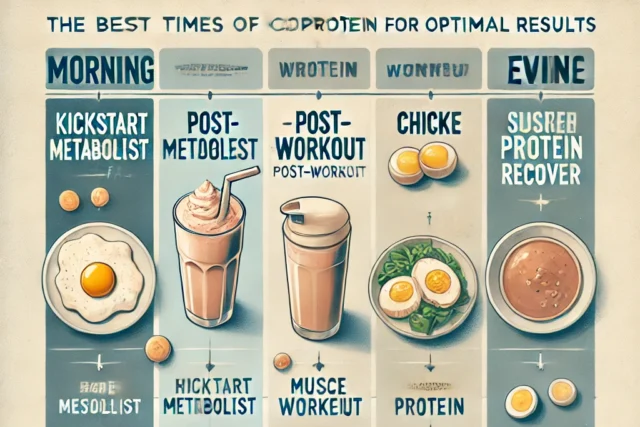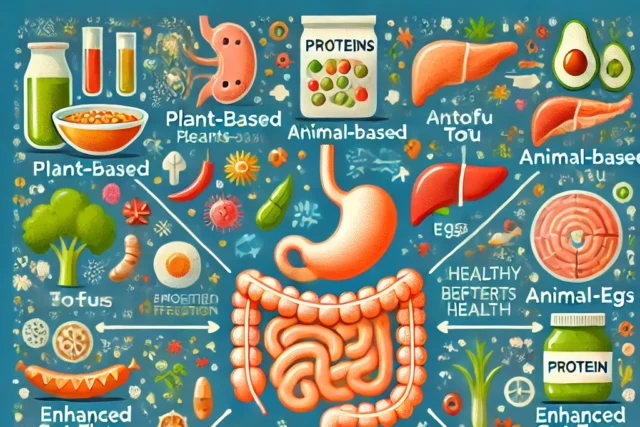Introduction
Protein plays a vital role in muscle growth, recovery, weight management, and overall wellness. While most people understand the importance of getting enough protein, fewer realize that timing can make a significant difference in achieving fitness goals. By strategically consuming protein at certain times, you can optimize muscle synthesis, boost recovery, and even improve your metabolism. Let’s look at the best times to consume protein and how it can help you maximize your fitness efforts.
Understanding Protein Timing and Its Benefits
Protein timing refers to consuming protein at specific points throughout the day to enhance its impact on your body. While getting the right amount of protein is essential, distributing it at ideal times can increase muscle protein synthesis (MPS), maintain energy levels, and support long-term metabolic health.

Protein Synthesis and Muscle Growth
Muscle growth occurs through a balance of muscle breakdown and muscle protein synthesis. When you consume protein, amino acids are absorbed and used by your body to repair muscle fibers, creating new, stronger tissue. Timing protein around your workouts can enhance muscle synthesis and, over time, lead to greater strength and muscle mass gains.
Weight Management and Satiety
Protein is more satiating than carbs and fats, meaning it can help you feel fuller for longer. Consuming protein at strategic points throughout the day can help reduce overall calorie intake by curbing hunger and preventing excessive snacking. For those looking to manage weight, well-timed protein can be a powerful ally in reducing cravings and helping maintain a balanced calorie intake.
Best Times to Consume Protein for Optimal Results
Morning – The Benefits of Starting the Day with Protein
Starting your day with a protein-rich meal can kickstart your metabolism and help you feel more energized. A high-protein breakfast is also linked to more stable blood sugar levels, which helps maintain energy and reduce cravings later in the day.
- Impact of Morning Protein on Blood Sugar Levels: Studies show that consuming protein in the morning reduces glucose spikes, providing steady energy levels and improved focus.
- Example High-Protein Breakfast Ideas: Opt for foods like Greek yogurt, eggs, cottage cheese, or protein smoothies. These options are easy to prepare and pack a substantial protein punch.
Pre-Workout Protein – Fueling Your Muscles Before Exercise
Pre-workout protein intake helps fuel your muscles, providing the amino acids necessary for endurance and strength during exercise. By consuming protein roughly 30 minutes to two hours before working out, you give your body the resources to perform optimally.
- Ideal Timeframe for Pre-Workout Protein Intake: Aim to eat protein about 1-2 hours before exercising for optimal digestion and muscle fuel.
- Suggested Pre-Workout Protein Sources: Choose easily digestible protein options, such as a protein shake, smoothie, or a small meal with lean protein sources like chicken, tofu, or cottage cheese.
Post-Workout Protein – Essential for Recovery and Growth
After working out, the body is primed for nutrient absorption. Consuming protein within a 30-minute to 2-hour window post-exercise can boost muscle recovery and repair, making it essential for anyone looking to gain strength or recover faster.
- Timing Tips for Post-Workout Protein: Consuming protein shortly after your workout maximizes muscle protein synthesis and helps reduce muscle soreness.
- Recommended Post-Workout Protein Choices: Whey protein is a popular choice post-workout due to its fast absorption rate, but other options like chicken, eggs, or a plant-based protein shake also work well.
Protein Before Bed – Supporting Overnight Muscle Recovery
Nighttime protein can help maintain muscle mass and aid recovery as you sleep. Slow-digesting proteins like casein can provide a steady stream of amino acids, ensuring your muscles get the support they need through the night.
- How Protein Before Bed Affects Metabolism Overnight: Slow-digesting proteins support muscle repair and prevent muscle breakdown overnight.
- Best Bedtime Protein Options: Opt for casein protein powder, cottage cheese, or Greek yogurt as bedtime options to keep your body in an anabolic state while you sleep.
Daily Protein Distribution and the Importance of Consistency

Why Spreading Protein Intake Throughout the Day Matters
Consuming protein at regular intervals, rather than in one or two large meals, has been shown to enhance muscle synthesis and improve overall protein absorption. For most people, this means aiming for around 20-30 grams of protein per meal across breakfast, lunch, dinner, and snacks.
Recommended Protein Sources for Each Meal
Incorporating protein into every meal keeps you fuller and supports muscle maintenance. High-protein foods like lean meats, beans, dairy, tofu, and nuts can be easily incorporated into any meal or snack.
- High-Protein Foods for a Balanced Diet: Consider foods such as eggs, lentils, chicken breast, Greek yogurt, quinoa, and cottage cheese to cover all your protein needs throughout the day.
Protein Needs Based on Fitness Goals
Protein for Muscle Gain and Bodybuilding
For those aiming to build muscle, protein timing and quantity are crucial. Aim to consume protein both before and after workouts, with a target of around 1.6-2.2 grams of protein per kilogram of body weight daily.
Protein for Weight Loss and Fat Burning
Protein can also help with weight loss by boosting metabolism and curbing hunger. Regular protein intake, especially in the morning and between meals, can reduce the likelihood of overeating.
Protein Intake for General Wellness and Maintenance
For those looking to maintain health without specific fitness goals, moderate protein intake distributed evenly across meals helps support energy levels and muscle health.
Common Mistakes in Protein Timing and How to Avoid Them
It’s easy to overlook the importance of protein timing, leading to missed opportunities for muscle growth or recovery. Common pitfalls include consuming all protein at once or not getting enough protein at breakfast. To avoid these issues, aim for a balanced intake with 20-30 grams of protein per meal.
- Mistakes That Hinder Muscle Growth and Recovery: Consuming all protein in one meal or neglecting protein around workout times are common mistakes.
Tips for Choosing the Right Type of Protein

There are various types of protein, each with unique absorption rates. For example, whey protein is quickly absorbed, making it ideal for post-workout, while casein digests more slowly, making it better suited for nighttime consumption.
- Comparison of Animal-Based vs. Plant-Based Proteins: Animal proteins provide a complete amino acid profile, but many plant-based options, like quinoa and soy, offer high-quality protein too.
Conclusion
Understanding protein timing is a game-changer for anyone looking to optimize their diet for muscle growth, recovery, or weight management. By incorporating protein strategically—morning, pre- and post-workout, and before bed—you can maximize its benefits and get closer to your fitness goals. Experiment with different times and types of protein to find what works best for your body.
FAQs
- How much protein is ideal per meal for muscle growth?
Aiming for around 20-30 grams of protein per meal is ideal for supporting muscle protein synthesis throughout the day. - Can I get enough protein from a plant-based diet?
Absolutely! Plant-based proteins like lentils, chickpeas, tofu, and quinoa can provide sufficient protein, especially when combined for a complete amino acid profile. - Is it better to consume protein in a shake or through whole foods?
Both have benefits. Shakes offer convenience and quick absorption, while whole foods provide additional nutrients and more sustained energy. - How much time before a workout should I consume protein?
About 1-2 hours before working out is ideal for most people to allow digestion and provide energy for the workout. - What are the best snacks high in protein for between meals?
Greek yogurt, cottage cheese, hard-boiled eggs, and protein bars make excellent high-protein snacks.



MOST COMMENTED
Animal-Based Proteins / Casein Protein / Dietary Protein / High-Protein Diets / Pea Protein / Plant-Based Proteins / Protein / Protein Deficiency / Protein Supplements / Proteins / Whey Protein / Whey Proteins
Is Protein Powder Safe for Teenagers and Children?
Animal-Based Proteins / Casein Protein / Dietary Protein / High-Protein Diets / Pea Protein / Plant-Based Proteins / Protein / Protein Deficiency / Protein Supplements / Proteins / Whey Protein / Whey Proteins
Unlock the Power of Proteins for Optimal Gut Health
Multivitamin
Total Health: Multivitamin for Active Lifestyles
Multivitamin
WellnessFusion: Complete Multivitamin Support
Dietary Supplement
Revitalize Your Health: The Magic of Red Yeast Rice Capsules
Foot care / Foot Health
Revitalize Your Foot Care Routine: Essential Tips for Optimal Foot Health
Foot Problem / Diabetics / Foot Health
Diabetics: Mastering Footwear Selection for Enhanced Foot Health and Ultimate Comfort
Exercises and Footwear Tips for Hammertoe Relief / Foot care / Foot Health / Foot Pain / Foot Problem / Hammertoes
Unlock Effective Exercises and Footwear Tips for Hammertoe Relief
Hammertoes / Foot Health / Foot Pain / Foot Problem
Unlock Relief: Essential Guide to Hammertoes Causes, Symptoms, and Treatments
Foot Problem / Foot Health
Revolutionize Your Recovery: Natural Remedies for Plantar Fasciitis – Fresh Home Keepers